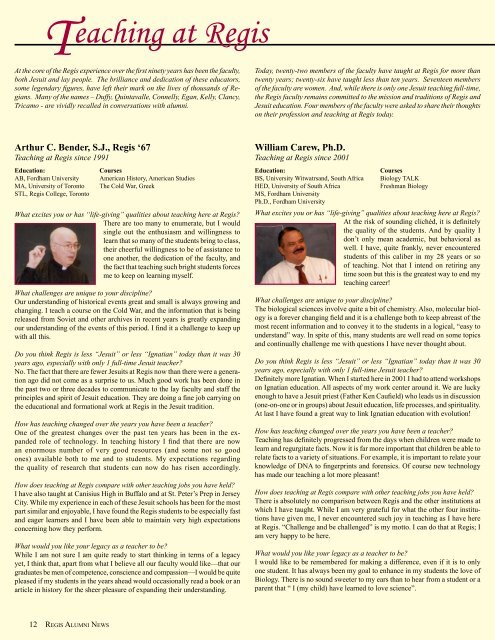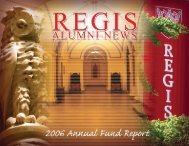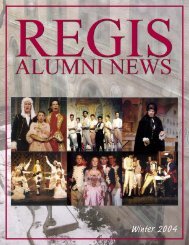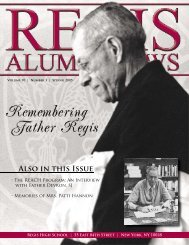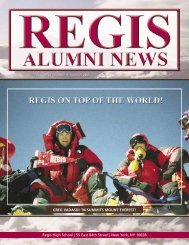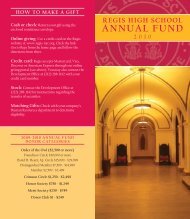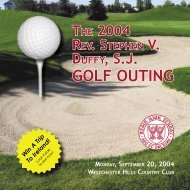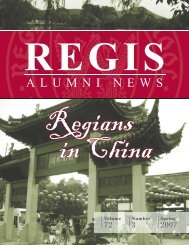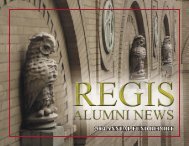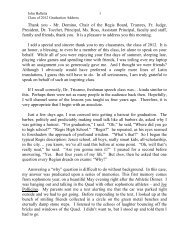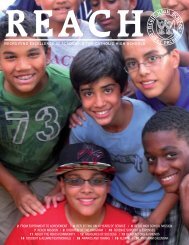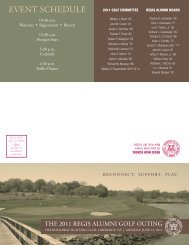REGIS
RAN - Dec 03 FINAL 1-4-04.indd - Regis High School
RAN - Dec 03 FINAL 1-4-04.indd - Regis High School
- No tags were found...
You also want an ePaper? Increase the reach of your titles
YUMPU automatically turns print PDFs into web optimized ePapers that Google loves.
T<br />
eaching at Regis<br />
At the core of the Regis experience over the first ninety years has been the faculty,<br />
both Jesuit and lay people. The brilliance and dedication of these educators,<br />
some legendary fi gures, have left their mark on the lives of thousands of Regians.<br />
Many of the names – Duffy, Quintavalle, Connelly, Egan, Kelly, Clancy,<br />
Tricamo - are vividly recalled in conversations with alumni.<br />
Today, twenty-two members of the faculty have taught at Regis for more than<br />
twenty years; twenty-six have taught less than ten years. Seventeen members<br />
of the faculty are women. And, while there is only one Jesuit teaching full-time,<br />
the Regis faculty remains committed to the mission and traditions of Regis and<br />
Jesuit education. Four members of the faculty were asked to share their thoughts<br />
on their profession and teaching at Regis today.<br />
Arthur C. Bender, S.J., Regis ‘67<br />
Teaching at Regis since 1991<br />
Education:<br />
AB, Fordham University<br />
MA, University of Toronto<br />
STL, Regis College, Toronto<br />
Courses<br />
American History, American Studies<br />
The Cold War, Greek<br />
What excites you or has “life-giving” qualities about teaching here at Regis?<br />
There are too many to enumerate, but I would<br />
single out the enthusiasm and willingness to<br />
learn that so many of the students bring to class,<br />
their cheerful willingness to be of assistance to<br />
one another, the dedication of the faculty, and<br />
the fact that teaching such bright students forces<br />
me to keep on learning myself.<br />
What challenges are unique to your discipline?<br />
Our understanding of historical events great and small is always growing and<br />
changing. I teach a course on the Cold War, and the information that is being<br />
released from Soviet and other archives in recent years is greatly expanding<br />
our understanding of the events of this period. I find it a challenge to keep up<br />
with all this.<br />
Do you think Regis is less “Jesuit” or less “Ignatian” today than it was 30<br />
years ago, especially with only 1 full-time Jesuit teacher?<br />
No. The fact that there are fewer Jesuits at Regis now than there were a generation<br />
ago did not come as a surprise to us. Much good work has been done in<br />
the past two or three decades to communicate to the lay faculty and staff the<br />
principles and spirit of Jesuit education. They are doing a fine job carrying on<br />
the educational and formational work at Regis in the Jesuit tradition.<br />
How has teaching changed over the years you have been a teacher?<br />
One of the greatest changes over the past ten years has been in the expanded<br />
role of technology. In teaching history I find that there are now<br />
an enormous number of very good resources (and some not so good<br />
ones) available both to me and to students. My expectations regarding<br />
the quality of research that students can now do has risen accordingly.<br />
How does teaching at Regis compare with other teaching jobs you have held?<br />
I have also taught at Canisius High in Buffalo and at St. Peter’s Prep in Jersey<br />
City. While my experience in each of these Jesuit schools has been for the most<br />
part similar and enjoyable, I have found the Regis students to be especially fast<br />
and eager learners and I have been able to maintain very high expectations<br />
concerning how they perform.<br />
What would you like your legacy as a teacher to be?<br />
While I am not sure I am quite ready to start thinking in terms of a legacy<br />
yet, I think that, apart from what I believe all our faculty would like—that our<br />
graduates be men of competence, conscience and compassion—I would be quite<br />
pleased if my students in the years ahead would occasionally read a book or an<br />
article in history for the sheer pleasure of expanding their understanding.<br />
William Carew, Ph.D.<br />
Teaching at Regis since 2001<br />
Education:<br />
BS, University Witwatrsand, South Africa<br />
HED, University of South Africa<br />
MS, Fordham University<br />
Ph.D., Fordham University<br />
Courses<br />
Biology TALK<br />
Freshman Biology<br />
What excites you or has “life-giving” qualities about teaching here at Regis?<br />
At the risk of sounding clichéd, it is definitely<br />
the quality of the students. And by quality I<br />
don’t only mean academic, but behavioral as<br />
well. I have, quite frankly, never encountered<br />
students of this caliber in my 28 years or so<br />
of teaching. Not that I intend on retiring any<br />
time soon but this is the greatest way to end my<br />
teaching career!<br />
What challenges are unique to your discipline?<br />
The biological sciences involve quite a bit of chemistry. Also, molecular biology<br />
is a forever changing field and it is a challenge both to keep abreast of the<br />
most recent information and to convey it to the students in a logical, “easy to<br />
understand” way. In spite of this, many students are well read on some topics<br />
and continually challenge me with questions I have never thought about.<br />
Do you think Regis is less “Jesuit” or less “Ignatian” today than it was 30<br />
years ago, especially with only 1 full-time Jesuit teacher?<br />
Definitely more Ignatian. When I started here in 2001 I had to attend workshops<br />
on Ignatian education. All aspects of my work center around it. We are lucky<br />
enough to have a Jesuit priest (Father Ken Caufield) who leads us in discussion<br />
(one-on-one or in groups) about Jesuit education, life processes, and spirituality.<br />
At last I have found a great way to link Ignatian education with evolution!<br />
How has teaching changed over the years you have been a teacher?<br />
Teaching has definitely progressed from the days when children were made to<br />
learn and regurgitate facts. Now it is far more important that children be able to<br />
relate facts to a variety of situations. For example, it is important to relate your<br />
knowledge of DNA to fingerprints and forensics. Of course new technology<br />
has made our teaching a lot more pleasant!<br />
How does teaching at Regis compare with other teaching jobs you have held?<br />
There is absolutely no comparison between Regis and the other institutions at<br />
which I have taught. While I am very grateful for what the other four institutions<br />
have given me, I never encountered such joy in teaching as I have here<br />
at Regis. “Challenge and be challenged” is my motto. I can do that at Regis; I<br />
am very happy to be here.<br />
What would you like your legacy as a teacher to be?<br />
I would like to be remembered for making a difference, even if it is to only<br />
one student. It has always been my goal to enhance in my students the love of<br />
Biology. There is no sound sweeter to my ears than to hear from a student or a<br />
parent that “ I (my child) have learned to love science”.<br />
12 <strong>REGIS</strong> ALUMNI NEWS


